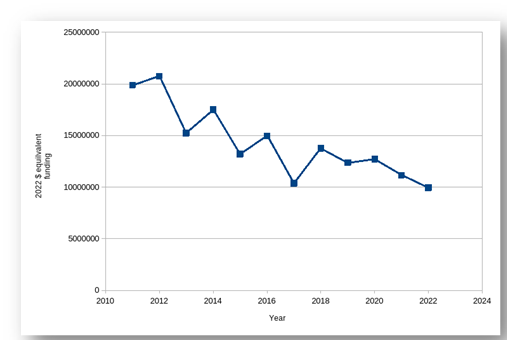On Australian Research Council funding over the last 10 years
A .docx copy is available here:
Mathematics of Computation and Optimisation (MoCaO) (www.mocao.org) represents more than 250 Australian mathematicians involved in the development of modern computational techniques for modern data science, machine learning and physical modelling. These computational techniques are the vital engines that power the software utilized by researchers in the latter fields (the analogy of maths engines powering software ‘vehicles’ will be used throughout this report). MoCaO is concerned that the funding opportunities and the amounts funded for critical fundamental research have been in decline for many decades.
The absolute amount of funding has not risen in dollar adjusted terms in this period while on the other hand, here has also been an increase in the number of funded grant streams supported by the government.
Australian Mathematical Sciences Institute (members include Australian Signals Directorate, RBA, and 28 universities) and MATRIX Institute have recently published the report Research Investment and Expenditure into the Mathematical Sciences. This report highlights critical shortfalls in relation to funding of research in the mathematical sciences. Central to these concerns is that funding for the mathematical sciences (the engines) has decreased, as more funding has been diverted to applied research (the projects made possible by the software ‘vehicles’). This is to the direct detriment of fundamental research, and to the broader detriment of all, since large-scale modern problems faced by Australian industry require ever more powerful mathematical engines. The report also notes that “ARC investment in the schemes most relevant to the Mathematical Sciences … is roughly on par with investment in other STEMM disciplines, except for a noticeable drop in DECRAs.” Despite this being true in relative terms (i.e. in relation to overall funding in ARC Discovery grants etc) MoCaO remains concerned, as a representative body for the computational mathematical sciences, that this assessment hides the reduction of funding in absolute terms during this last 10year period in funding of ARC DP grants. The decline in DECRA funding is particularly alarming, as it could accelerate the exit of new talent from research. At AMSI Summer School Careers Day, companies routinely advertise salaries in excess of $250,000 for students with PhDs in computational mathematics.
In the table below, the total amount (in AUD) of ARC/DP grants in all areas of mathematics per year over the last decade is shown. The number at each row represents the total value awarded to ARD/DP grants that year with FoR codes 0101 (Pure Mathematics, 0102 (Applied Mathematics) and 0103 (Numerical and Computational Mathematics). We then used the Reserve Bank of Australia’s site to convert the figures to the current dollar values.
The data, in today dollars, is displayed in Figure 1. In ten years, the funding for ARC/DP grants has been essentially halved.
| Year | Amount in AUD |
| 2022 | 9929000 |
| 2021 | 10462488 |
| 2020 | 11593438 |
| 2019 | 11178546 |
| 2018 | 12240632 |
| 2017 | 9063642 |
| 2016 | 12816771 |
| 2015 | 11162100 |
| 2014 | 14582737 |
| 2013 | 12386233 |
| 2012 | 16461942 |
| 2011 | 15495628 |
Total amount of ARC/DP grants in pure/applied/computational maths. Data extracted from “Yearly_funding_allocation_Nov2022.xlsx” which is available publicly at https://www.arc.gov.au/funding-research/funding-outcome/grants-dataset

Fig 1. Total ARC/DP funding for mathematics in today dollars.
The executive summary of the AMSI-MATRIX report “Research Investment and Expenditure into the Mathematical Sciences” states: “Basic research should be properly funded for Australia’s long term prosperity. In addition, it is essential that research facilities in the Mathematical Sciences are well supported as National Research Infrastructure.” MoCaO emphasizes that the reduced funding opportunities in ARC\DP and DECRA grants is having a particularly detrimental impact on the career opportunities for younger emerging researchers in the mathematical sciences in Australia. This has the potential to inflict longer term damage to Australia’s international standing in the Mathematical Sciences.